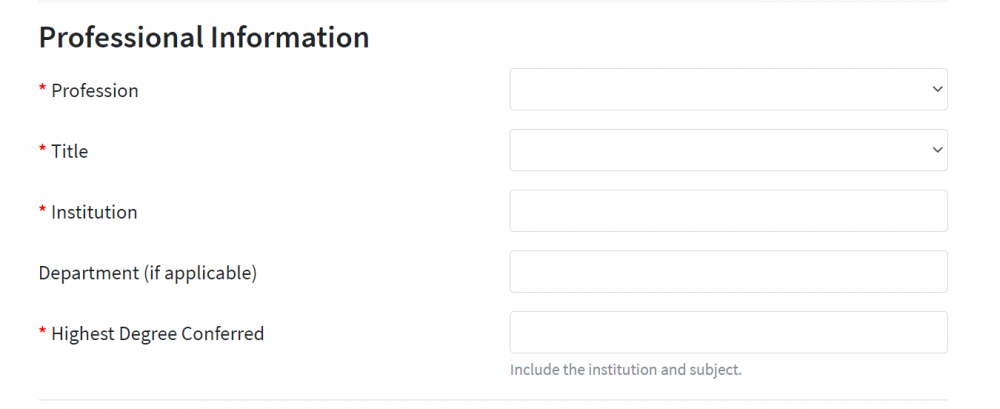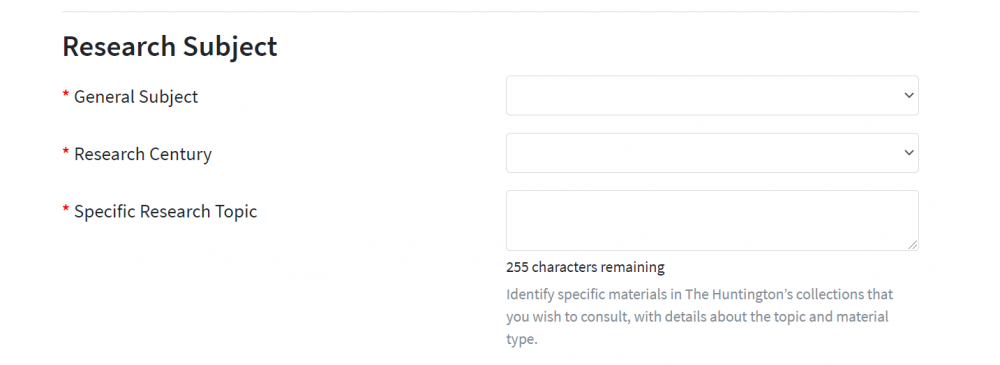
lelick1234
Members-
Posts
83 -
Joined
-
Last visited
Profile Information
-
Location
Egypt
-
Application Season
2016 Fall
-
Program
History
Recent Profile Visitors
2,519 profile views
lelick1234's Achievements

Espresso Shot (4/10)
3
Reputation
-
I was wondering if there were academic (ish) journals who publish the work of independent researchers. Do some of the academic journals publish independent researchers?
-
 lelick1234 reacted to a post in a topic:
Let the Public Get the Documents
lelick1234 reacted to a post in a topic:
Let the Public Get the Documents
-
 lelick1234 reacted to a post in a topic:
Let the Public Get the Documents
lelick1234 reacted to a post in a topic:
Let the Public Get the Documents
-
 lelick1234 reacted to a post in a topic:
Let the Public Get the Documents
lelick1234 reacted to a post in a topic:
Let the Public Get the Documents
-
Yes, this advice is well-taken. I do have a bit of chip on my shoulder that might not be warranted. But it is based on the fear that I would not even get the chance to prove that I can learn how to handle documents properly. You do, however, bring up an important issue. When Covid is over, I should visit some research libraries to get comfortable with the process and people who responsible for keeping these important documents for future research. I believe that the Reagan library does offer access to the public without an application process. There might be others. Luckily, I currently live in the city I am researching, which is 30 minutes from Los Angeles, which probably has plenty of archives I can gain access to. Now that I think of it, the local historian who runs the historical society hinted that the community's archives are a mess. Maybe if I could offer to help, I could make a compelling case for having experience with working responsibly with documents. Also, you are probably right. Maybe making a good impression with archivists by phone might help when they go over my application. They can attach a charming, intellectually stimulating and relevant conversation to an otherwise lackluster application. Good advice overall.
-
 lelick1234 reacted to a post in a topic:
Let the Public Get the Documents
lelick1234 reacted to a post in a topic:
Let the Public Get the Documents
-
 lelick1234 reacted to a post in a topic:
Let the Public Get the Documents
lelick1234 reacted to a post in a topic:
Let the Public Get the Documents
-
This was an excellent response. I am in a weird place between local boosters in the community who hate it when I post about serious historical topics economics, race, and politics and then the academic establishment. But maybe the academic establishment might be more open. If Covid ever improves in Los Angeles and the archives open up, I will try what you have suggested.
-
 lelick1234 reacted to a post in a topic:
Let the Public Get the Documents
lelick1234 reacted to a post in a topic:
Let the Public Get the Documents
-
No, it does not. It has independent researcher. I am trying my best to build up a non-traditional, working class academic ethos and approach to research. It is almost possible, but the existence of applications to gain access to archives is a bit demoralizing. Honestly, I believe contacting them right now would be premature because I am still hashing out my ideas. I am railing against their "elitism" in tongue and cheek sort of way in the original post. But honestly, I do not want to gain access to the archives and then not be adequately prepared.
-
I guess I am asking whether anyone faced this issue when doing their own archival work. And if anyone has faced an application, what did you write?
-
The application requires that list highest degree conferred and asks for a professional title. Middle School teacher is not one of the options. It does ask for a 250 word explanation about my project and why I need access to the archives. I have already picked out the box of documents that I would want to look at as they are online. So, my research is very specific. That might help.
-
But that is the thing. I am not in graduate school, nor does the Huntington Library accept students as "qualified readers." I have no supervisor. This is completely independent research. I need an alternative means of justifying my application to the document masters. Would I have to do side-projects and get some articles published by the local newspaper or something? It seems like unnecessary gatekeeping. I don't think the Reagan library has the same restrictions but I could be wrong.
-
Hello Folks, I have been long-time lurker on this forum but have basically given up hope on graduate school. This is partly because I have an OK teaching job in history that I am getting better at so that I am able to finally have some free-time for historical research. I have been so surprised that my interest in local history (a suburban city north of Los Angeles) has made me feel no regrets abandoning my original research focus: American foreign policy towards the Middle East. But I have a question about archives for independent researchers. In some ways, local history has been easier as far as archival work for me. My community has a very active, powerful local newspaper that offers access to its archives all the way back to 1919. It has been very useful in allowing get an idea about the general thrust of the community's history. However, my particular town was basically a company town controlled by Newhall Land and Farm Corporation. Its archives can be found at the Huntington Library, which I live about an hour away from. I just assumed the public would have access to all archives in California. But no! We can't let the unlettered get their grimy hands and dull minds on the documents. They might not be able to handle it. I have a BA in history (3.95 GPA) from UCSB am very serious in pursuing archival research. It is unclear what constitutes a "qualified researcher" but I have a feeling it means having a PhD in history. The Huntington Library does not explain clearly who is a good candidate to become a "Reader." So I have two questions: 1. What represents a "qualified researcher"? 2. How could I show that I am a qualified researcher? Would being a board member of the local historical society be sufficient enough. I am not yet, but I am working towards this. 3. Why is cutting off the public from access to archives the worst form of academic elitism that will undoubtedly doom the field of history? Yes, yes, I know some of you are going to say that I am cutting in line in front of people who can do graduate school...but come on. 4. In a world where academic history is becoming an even more marginalized field, wouldn't it make more sense , in a time where technology has increased the opportunities for the production of historical content, to just open up the floodgates, let the masses get their dirty fingers on the documents? --Leo
-
From my experience in dealing with prospective professors in the field, they would like you to be at a proficient reading level in one of the Middle Eastern Languages before applying to a PhD program.
-
Thanks for all of your wonderful contributions. This global history of the 20th Century podcast is a life-long project that will hopefully keep me busy for many years reading, writing, and recording. Since we have basically covered the origins of the the Great War, can I get any suggestions about literature that discusses the global consequences of the war. I am personally excited to read Erez Manela's The Wilsonian Moment. https://www.amazon.com/Wilsonian-Moment-Self-Determination-International-Anticolonial/dp/0195378539?ie=UTF8&ref_=asap_bc
-
 lelick1234 reacted to a post in a topic:
World War I Historiography
lelick1234 reacted to a post in a topic:
World War I Historiography
-
After examining the reference page of the World History textbook entitled Worlds Together, Worlds Apart, it seems that the authors' main reference was John H. Morrow's Great War: An Imperial History. Looks pretty interesting. https://www.amazon.com/Great-War-Imperial-History/dp/0415204402/ref=sr_1_1?s=books&ie=UTF8&qid=1468605926&sr=1-1&keywords=The+Great+War+an+Imperial+History While the developments of Europe are important, since my research project is a global history, I feel that I have to focus on works that internationalize the conflict as means to make fluid transitions to cover different regions of the world and cover themes. Industrial Capitalism + Nationalism ( Great Britain, France, Austro-Hungary, The Balkans, The United States?) + Imperialism (Sub-Saharan Africa, Egypt, Syria, India, China). * Japan's modernization would have to fit somewhere in there too. Anyways just some thoughts.
-
This was very helpful. Exactly what I needed. I will be posting what I learn from this research if you have any other guidance.
-
 lelick1234 reacted to a post in a topic:
World War I Historiography
lelick1234 reacted to a post in a topic:
World War I Historiography
-
Hello, I am preparing a podcast for my future high school students about the Global 20th Century. I am looking for some guidance about the causes of the First World War. My natural historical inclination is to focus on how the structural political/ideological trajectory of Europe at the beginning of the 20th century made the political crisis that lead to the war almost inevitable. That is my general approach, which is probably the easiest way to include the Great War into a narrative that expands into the contemporary. I have access to the following books from the local library: Cataclysm by David Stevenson The Age of Empire and The Age of Crises by Eric Hobsawn Sleepwalkers by Christopher Clark The First World War by John Keegan What else should I possibly read to gain a better understanding of causes of WWI? --Leo
-
Sigba, You are totally right. I am having an identity crisis. My essay is about Carter's human rights policy towards Iran. I am hoping to specialize in US foreign policy towards the Middle East. I do not think I will be able to avoid controversy. There is a general historiography towards that period that I think I can illuminate and balance with the Wikileaks sources. --Leo
-
 lelick1234 reacted to a post in a topic:
Wikileaks and Writing Sample
lelick1234 reacted to a post in a topic:
Wikileaks and Writing Sample
-
I know that some political science, government-track academics have shunned using wikileaks for fear of losing future security clearances for government jobs. What about academics that have no interest in government service? Has anyone heard of an academic article been shunned for using Wikileaks documents? I am just asking because I have found many leaked documents that modify my view of an undergraduate thesis that I wrote and want to turn into a writing sample for graduate applications. Should I be safe and not include them even if I feel that the original argument is now slightly flawed in light of these new sources? According to Wikileaks, the documents have been declassified in 2014, but I do not have access to the National Security Archives since I am not affiliated with a university library that has access to the sources. The paper contains extensive primary sources obtained through the National Security Archives also, and is not completely wikileaks reliant.



